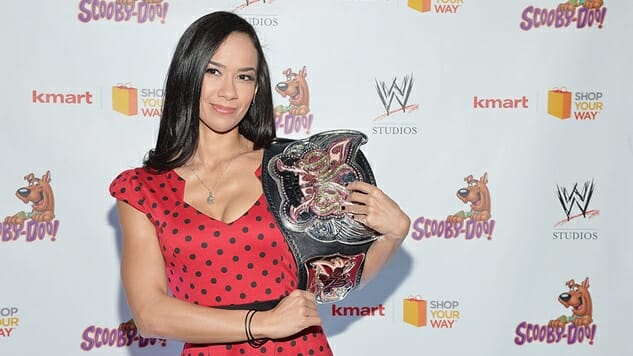AJ Lee’s Memoir and Wrestling’s Handling of Mental Illness
Photo by Mike Coppola / Getty Wrestling Features AJ Mendez Brooks
The opening sentence of chapter four of AJ Mendez Brooks’s—formerly World Wrestling Entertainment Diva AJ Lee—memoir, Crazy is My Superpower, begins thusly: “It might be hard to reconcile the fact that I wore denim booty shorts for a living with the fact that I don’t have daddy issues.”
I largely missed AJ’s meteoric rise, returning casually to WWE in 2013, right around AJ’s final feuds with the cast of Total Divas and the Bella twins. The bulk of this storyline seemed to consist of allegations that the Bellas and the rest of their Total Divas ilk (the majority of the women’s wrestling division at the time) had no wrestling talent and slept their way to success. In this way, Lee was essentially presenting Nia Jax’s “not like most girls” schtick long before Jax came on the scene.
Much of the rest of Crazy is My Superpower engages in similar efforts to position Mendez Brooks as different to other girls and women. She often reiterates how, as a child and teenager, she preferred the company of boys, which there’s nothing inherently wrong with, but it was because other girls wore “clothes so short and tight a passerby would have no trouble describing [their] Fallopian tubes to a sketch artist.” Cool girls who don’t give a fuck, like Mendez Brooks, wear “asexual sweatpants and Chuck Taylors,” don’t you know. She also warns her future daughter not to “post [her] boobs to Instagram” and asserts that women taking selfies are, again, the manifestation of withholding fathers.
Instead of vilifying her own abusive and drug-addicted father, though, the bulk of Mendez Brooks’s troubled upbringing is credited to her bipolar mother, whom she had to physically protect from her father. Her undiagnosed mental illness meant she would overreact to small things, such as the time Mendez Brooks smashed a glass while washing it and her mother scraped the shards into her skin as she was trying to clean up the mess, and shame her for her burgeoning sexuality, which no doubt contributed to her vilification of other women for using their sexuality to get ahead.
During the publicity for this book it was revealed that Mendez Brooks, too, has bipolar disorder. When discussions surrounding mental illness and bullying are taking place in WWE (or, at least, about WWE), with SmackDown Live announcer Mauro Ranallo leaving the company shortly after bullying from fellow announcer JBL contributed to a relapse of Ranallo’s bipolar disorder, Crazy is My Superpower couldn’t have come at a more opportune time.
When I first picked it up, I was concerned that the insensitive title was just a way to cheaply associate Mendez Brooks’s memoir with her successful WWE character. But she provides insight to her motivations for her portrayal, which was initially intended to be a parody of mental illness, and perhaps sheds light on something that is seldom discussed in wrestling and sports more broadly. The reactions from within the wrestling community from the likes of Booker T and others indicate that a book such as this is needed.
In a way, Crazy is My Superpower is a reclamation of the word “crazy,” which her mother told her not to “act” as when Mendez Brooks’s mental illness reared its head in her adolescence. She said as much in an interview with Paste:
“I titled the book Crazy is My Superpower specifically because I believe when you proudly own what others might perceive as a flaw, you give yourself all of the power. There is no way for a word to be used pejoratively; there is no way for it to be a weapon against you, when you wear it as a badge of honor.”
As Mendez Brooks acknowledges, WWE hasn’t had the greatest track record in dealing with mental health issues, but with the revelations in Crazy is My Superpower and of Ranallo’s conditions, as well as a rise in rich, varied and sensitive depictions of mental illness across pop culture in general, it has a responsibility to its employees and fans to get with the times and offer less simplistic portrayals of and attitudes towards mental illness.
Scarlett Harris is an Australian writer. You can read her previously published work at her website The Scarlett Woman, and follow her on Twitter at @ScarlettEHarris.